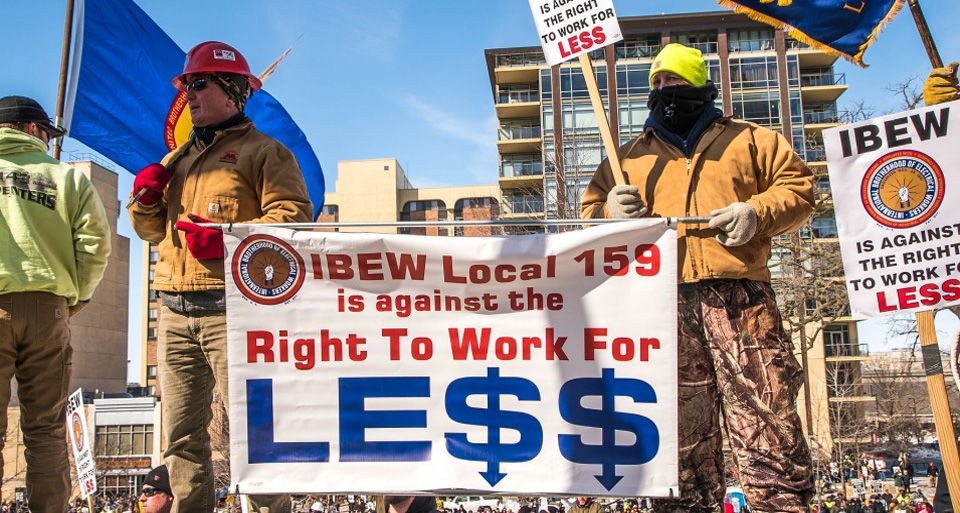
On Tuesday November 8, voters in Virginia will decide on the presidential election between Hillary Clinton and Donald Trump, and on the state’s eleven congressional districts. For labor, there is another high priority item.
“Proposition One” is one of two referendum items on the Virginia ballot this year. What it would do if approved is make “right to work” part of the state constitution. It is already statute law in Virginia, but the Republican majority in Virginia’s General Assembly (the state legislature) wants to make it a constitutional provision because that way, it would be very difficult to repeal in the future.
As most of our readers know, “right to work” is a deceptive name for a type of anti-worker, anti-union law which already exists in 26 states.
Many people think that “right to work” means “everybody should have the right to have a job”. Because of this misunderstanding, people may vote for this measure who themselves will be harmed by it, and would never vote for it if they knew what it was really about.
Proposition One is phrased in the following complicated way:
“Should Article I of the Constitution of Virginia be amended to prohibit any agreement or combination between an employer and a labor union or labor organization whereby (i) nonmembers of the union are denied the right to work for the employer, (ii) membership to [sic] the union or organization is made a condition of employment or continuation of employment by such an employer, or (iii) the union or organization acquires an employment monopoly in any such enterprise?”
Anybody familiar with labor struggles will recognize this as straight up union busting. The “union shop” will be prohibited. Unionized workers will be forced to subsidize nonunion workers in the same workplace who do not pay union dues, and unions will be weakened. That, and not “the right to have a job”, is the point of this noxious measure.
But this has been ordinary law in Virginia since 1946. Why such a push to put it into the constitution? Why such a flap from both sides?
Nationally ALEC, the right wing, corporate funded American Legislative Exchange Council, is pushing for “right to work” to be enshrined in state constitutions, as part of its war against workers and their unions.
Virginia’s demographics are changing, as are those of the whole country. Minority groups are increasing proportional to the whole population of the state, and population movements are bringing more people into Virginia from areas where the need for labor unions may be better understood. In some parts of Virginia, wages have been going down and poverty increasing.
Currently, only 5.4 percent of workers in Virginia are labor union members, and only 6.9 percent are represented by a union without necessarily being members. This is far lower than the national average of 11.1 percent , and puts Virginia close to the low unionization levels of places like Mississippi and the Carolinas.
Average wages in Virginia, according to the U.S. Department of Labor, are slightly higher than the national average ($1,057 a week versus $1,043 a week). However, this seemingly good news is deceptive. In fact, in many areas of the state, especially in the distressed Appalachian coal country and some other regions in the Southern part of the state, wages are very low indeed, and working conditions are very substandard. The Virginia average is brought up because of concentrations of better paid workers, employees of the federal government and its subcontractors in many cases, in the Washington D;.C. suburbs of Northern Virginia and some other areas. This seeming prosperity has nothing to do with Virginia being a low union density state; on the contrary!
To make “right to work” (for less, as the unions say) part of the state constitution and no longer merely a state law, the legislature has had to pass the constitutional amendment twice in two successive sessions, which it has done. The governor does not have the authority to veto this. Then the matter is put to a vote by the electorate, which is what will happen on November 8.
Once the thing is approved by referendum , changing it again is extremely difficult. Due to a combination of creative gerrymandering and extremely low electoral turnout in non-presidential years, the Republicans currently have a huge majority in the lower house (the House of Delegates) and a smaller one in the Senate. So Virginians would likely be stuck with the thing for a while.
This is why the Virginia AFL-CIO has made it a high priority to prevent Proposition One from passing.
In the words of Doris Crouse-Mays, President of the Virginia AFL-CIO, “This law has been on the books for more than 70 years and takes aim at workers’ rights to stand together and speak out in the workplace. I’ve personally worked in both union and nonunion facilities and I have seen the difference a collective bargaining agreement in the lives of working people—not always in wages, but in dignity and respect for one another.” Crouse Mays are asking that all working people vote “No” on Proposition One.
Labor is also, of course, pushing for a vote for Hillary Clinton for president. There is also a possibility of flipping three of Virginia’s eleven congressional districts from the Republicans to the Democrats. If that optimal scenario pans out, Virginia would have six Democrats in the House instead of the current three.












Comments